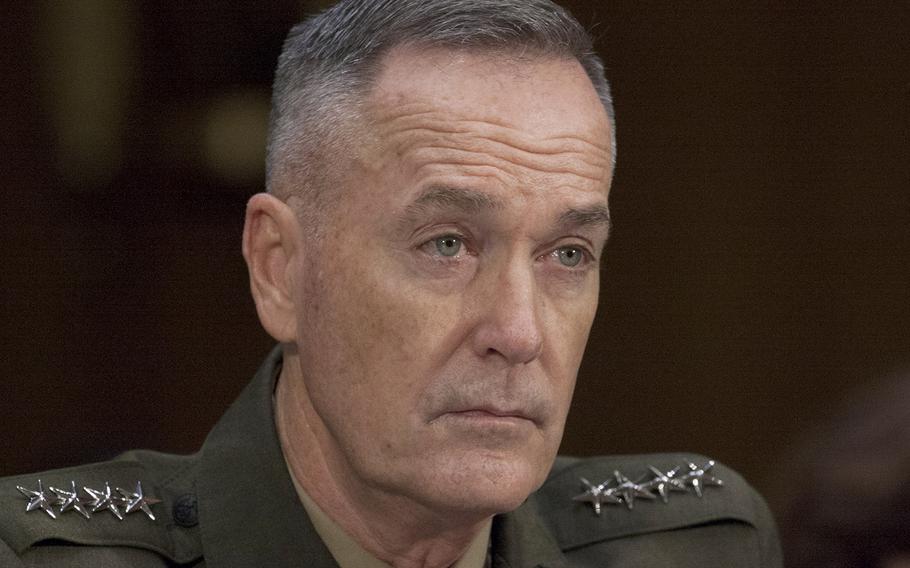
Gen. Joseph Dunford at a Senate hearing on Capitol Hill in January, 2015. (Joe Gromelski/Stars and Stripes)
STUTTGART, Germany — The growing diplomatic feud between arch rivals Saudi Arabia and Iran serves as a reminder of the volatile sectarian rifts that threaten security in the Middle East, the top U.S. military officer said Monday.
“To the extent that sectarianism is a source of instability, clearly we are concerned about the announcement Saudi Arabia is breaking off relations with Iran,” Gen. Joseph Dunford, chairman of the Joint Chiefs, said. “We’re looking pretty hard at what the implications are of this decision.”
Dunford, who spoke with reporters in Stuttgart, Germany, after meetings at the headquarters of the U.S. European and Africa Commands, said it was too early to draw any military conclusions from the dispute between Saudi Arabia and Iran. Saudi Arabia’s execution of Shiite cleric Nimr Al-Nimr, a prominent advocate for the country’s Shiite minority and an anti-government critic, sparked demonstrations across the region. Riyadh cut off diplomatic ties with its longtime regional rival after an attack by an angry mob on its embassy in Iran.
Bahrain, a Saudi ally that is home to the U.S. 5th Fleet — which oversees U.S. naval activities in the region, including bomb raids against the Islamic State group in Iraq and Syria — also cut ties with Iran. The United Arab Emirates recalled its ambassador from Tehran.
“The challenge in the Middle East that has gotten the most attention has been ISIL,” Dunford said, using an acronym for the Islamic State group. “But clearly the sectarian challenges in the Middle East were there before ISIL, and those are the ones highlighted by the announcement of Saudi Arabia breaking off relations with Iran.”
For Dunford, who took over as President Barack Obama’s top unformed officer in October, the crisis in the Middle East and the battle against the Islamic State group are among a host of complicated security matters confronting the Pentagon.
During meetings with leaders at AFRICOM, the focus was on the spread of the Islamic State group into Libya, as well as other terrorist groups that have drawn closer to the militant juggernaut. For example, the Nigerian-based Boko Haram group has pledged allegiance to the Islamic State.
With Libya in political disarray, AFRICOM was forced to suspend in 2014 plans for an elaborate training program of government forces. Dunford said the U.S. is still interested in working with Libyan forces, but doubts persist over whether there is sufficient political stability to launch such a program. “I’m watching that pretty closely,” Dunford said.
In Europe, Russia’s aggressive actions in Ukraine have created a new security landscape on a continent that only two years ago was regarded as a place of post-Cold War calm.
On Monday, Moscow released a new military strategy document, signed by Russian President Vladimir Putin, which for the first time since the end of the Cold War named the U.S. and NATO as military threats.
Dunford said that he does not consider the position a new threat to U.S. forces in Europe but that it serves as a reminder that the U.S. and Russia aren’t operating as allies.
“I don’t think this indicates to me at all that the Russians have said they will conduct offensive operations in the near term or pose a threat to our forces,” he said.
Military leaders say they are closely watching Putin’s moves.
“I am not sure what he is thinking, but I can look at what he is doing and derive from that what we should be thinking about on our side,” said EUCOM chief Gen. Philip Breedlove during an earlier interview with reporters. “He’s building forces.”
“The fact he has codified in this language publicly is a message,” Breedlove added. “He sent us a message.”